Hi there,
I believe that people who are concerned about the climate catastrophe, economic and racial justice and war and peace, are not a fringe minority, not even a silent majority, but the silenced majority—silenced by the corporate media. That's why we have to take the media back—especially now. But we can't do it without your support. Thanks to a group of generous donors, all donations made today will be DOUBLED, which means your $15 gift is worth $30. With your contribution, we can continue to go to where the silence is, to bring you the voices of the silenced majority. Every dollar makes a difference. Thank you so much!
Democracy Now!
Amy Goodman
Hi there,
I believe that people who are concerned about the climate catastrophe, economic and racial justice and war and peace, are not a fringe minority, not even a silent majority, but the silenced majority—silenced by the corporate media. That's why we have to take the media back—especially now. But we can't do it without your support. Thanks to a group of generous donors, all donations made today will be DOUBLED, which means your $15 gift is worth $30. With your contribution, we can continue to go to where the silence is, to bring you the voices of the silenced majority. Every dollar makes a difference. Thank you so much!
Democracy Now!
Amy Goodman
Non-commercial news needs your support.
We rely on contributions from you, our viewers and listeners to do our work. If you visit us daily or weekly or even just once a month, now is a great time to make your monthly contribution.
Please do your part today.
HeadlinesAugust 09, 2007
U.S. Troops & Warplanes Raid Sadr City
U.S. troops and warplanes have waged a major attack on the Shiite neighborhood of Sadr City in Baghdad. U.S. officials say at least 32 Iraqi militants have been killed, but Iraqi police say at least nine of the dead are civilians. The Washington Post described the raid as one of the largest in a series of U.S. attacks against Shiite militias. The raid on Sadr City came shortly after Iraqi Prime Minister Nouri al-Maliki left Baghdad for Tehran, where he met with several Iranian leaders. Hundreds of Baghdad residents held protests last night against the U.S. for attacking Sadr City less than 24 hours before the start of a major Shiite holiday. Meanwhile, Iraqi officials have imposed a strict curfew and banned all vehicular traffic in Baghdad until Saturday in an attempt to prevent car bombings during the holiday.
Musharraf Considers Imposing Emergency Rule in Pakistan
The Pakistani press is reporting General Pervez Musharraf is considering imposing emergency rule in Pakistan, citing external and internal threats facing the country. Such a decree could restrict freedom of speech and movement. This year’s elections could also be postponed or suspended. Some critics of Musharraf say the move might be an attempt for him to cling to power amid separate challenges from the country’s secular pro-democracy movement and from Islamic groups. General Musharraf has ruled Pakistan since 1999, when he seized power in a military coup. Top Pakistani officials have given conflicting accounts on the possibility of emergency rule. Pakistan’s information minister said it has been discussed; however, the head of Musharraf’s Pakistan Muslim League said there was “no possibility” of such a move.
Pakistani and Afghan Tribal Elders Meet in Kabul
Meanwhile, some 700 tribal elders and officials from Pakistan and Afghanistan have begun meeting in Kabul to discuss the security situation along the borders of the two nations. Musharraf was scheduled to attend the jirga but canceled. Analysts say Musharraf’s absence will likely be a blow to efforts to combat pro-Taliban militants in the region.
Rescue Efforts Continue for Trapped Miners in Utah
Rescue efforts continue in Utah to reach six trapped coal miners. The Salt Lake Tribune reported it may soon be possible to lower food, water and oxygen to the trapped miners via holes bored into the mountaintop, but there have been no signs that the miners are still alive.
American Bar Assoc. Considers Resolution Criticizing Bush Order
The nation’s largest law association is preparing to vote on a resolution condemning President Bush’s recent executive order on interrogations and torture because it is inconsistent with the Geneva Conventions. The vote will take place during the American Bar Association’s annual meeting in San Francisco. The resolution calls on Congress to ensure that wherever detainees are held by U.S. government agencies, they are protected under Common Article 3 of the Geneva Conventions, which guarantees basic rights of humane treatment for individuals caught up in armed conflict, regardless of their status. The resolution has already been supported by the ABA’s Standing Committee on Law and National Security.
Election Calendar Shake-Up: South Carolina Moves Primary Date
In election news, South Carolina’s Republican Party is reportedly preparing to move its 2008 presidential primary forward to January 19. The Washington Post reports this decision will almost certainly spark a cascade of calendar changes that could push the start of voting in New Hampshire and Iowa to early January or even to before Christmas. South Carolina had been scheduled to hold its primary on Feb. 2 but then decided to move it ahead when Florida announced its primary would be on January 29. The earlier voting could create the longest-ever general election campaign. The nominees from the major two parties could be largely decided by mid-January, almost 10 months before Election Day.
GOP Pushes Ballot Initiative in California to Alter Electoral Vote
In California, Republican strategists are preparing to gather signatures for a ballot initiative that would alter how the state awards its electoral votes. It’s a move that could help a Republican win the White House in 2008. Historically, the winner of the presidential election in California wins all of the state’s 55 electoral votes. Backers of the ballot initiative want to apportion electoral votes by congressional district. Such a change could help Republicans win as many as 22 electoral votes in California even if a Democratic candidate wins the majority of votes in the state.
Romney Defends Sons’ Lack of Military Service
In other campaign news, Republican presidential candidate Mitt Romney was forced on Wednesday to defend the decisions of his five sons not to join the military. After being questioned at a campaign stop in Iowa, Romney said his sons have made other decisions to help the country. He said, “One of the ways my sons are showing support for our nation is helping me get elected because they think I’d be a great president.” Romney’s five sons range in age from 26 to 37 and have worked as real estate developers, sports marketers and advertising executives. They are now actively campaigning for their father and have a “Five Brothers” blog on Romney’s campaign site.
Ohio Destroyed or Lost 2/3 of 2004 Presidential Ballots
The website Alternet is reporting two-thirds of counties in Ohio have destroyed or lost their 2004 presidential ballots and related election records. The destruction of the election records will frustrate efforts by the media and historians to determine the accuracy of Ohio’s 2004 vote count, because in many counties the key evidence needed to understand vote count anomalies apparently no longer exists. Last year the U.S. district court ordered that the 2004 ballots be preserved while the court hears a civil rights lawsuit alleging voter suppression of African-American voters in Columbus. Attorney Cliff Arnebeck said: “The extent of the destruction of records is consistent with the covering up of the fraud that we believe occurred in the presidential election.”
Bush Considers Cutting Corporate Taxes
In news from Washington, President Bush said Wednesday he is inclined to push for more tax cuts for U.S. corporations. Treasury Secretary Henry Paulson has briefed Bush on various possibilities for overhauling the corporate tax structure to make it more advantageous for U.S. business. A paper Paulson released last month outlined how the corporate tax cut could be reduced by 8 percent.
Fatah Seeks Israel’s OK for New Arms Shipment
The Israeli newspaper Haaretz is reporting the Palestinian faction Fatah is seeking Israel’s approval to receive large shipments of weapons, ammunition and armored vehicles from Egypt and Jordan. The Palestinian Authority argues that it needs the weapons to preserve Fatah’s rule in the West Bank over Hamas. The arms shipment will be funded in part by an $80 million grant that the Bush administration gave the Palestinian Authority security forces after Palestinian President Mahmoud Abbas dismissed the democratically elected Hamas-led government.
Amnesty Criticizes Mexico’s Human Rights Record
Amnesty International Secretary General Irene Khan traveled to Mexico this week and openly criticized the country’s human rights record.
Irene Khan: “The purpose of Amnesty International’s mission has been to clarify the commitment of the new administration, President Felipe Calderon’s administration, to human rights and their willingness to put an end to this schizophrenic approach to human rights.”
Irene Khan of Amnesty said that flaws in Mexico’s criminal justice system currently allow for arbitrary detention, torture, denial of due process, unfair trials, political interference in the administration of justice, and widespread impunity. Last month, Amnesty urged the Mexican government to initiate a probe into human rights abuses committed last year in the state of Oaxaca.
U.N. Envoy Praises Darfur Peace Talks
U.N. envoy Jan Eliasson visited Darfur on Wednesday, but Sudanese security forces refused to allow journalists or African Union personnel to accompany him. After holding talks with Sudanese rebel groups in Tanzania, Eliasson toured Darfur, told hundreds of internally displaced people that peace could come after the fruitful talks in Tanzania.
Jan Eliasson: “The message is that now there is hope for peace, which is more than a hope. I think it’s expectations that talks shall begin so that we finally can bring this nightmare to an end. I think I feel how deep the pain is here. You meet people who have gone through conflict from different directions and have the horrors of war behind them, memories and images of the worst atrocities you can imagine.”
Six Peace Activists Arrested at Office of Rep. Sanchez (D-CA)
In California, six peace activists were arrested after they refused to leave the office of Democratic Congresswoman Loretta Sanchez. They were calling on her to oppose any additional Iraq War funding.
Spanish Civil War Veteran Moe Fishman, 92, Dies
And Spanish Civil War veteran Moe Fishman has died at the age of 92. In the late 1930s he volunteered with other Americans to fight General Franco and fascism in Spain. After the war ended, Fishman helped form the Veterans of Abraham Lincoln Brigade. Moe Fishman appeared on Democracy Now! in April.
Moe Fishman: “The International Brigade, of which we were a part, consisted of about 40,000 to 45,000 volunteers from 52 countries who came to the aid of the Spanish Republic, and I want to emphasize 'came to the aid of.' It was the Spanish Republic and their people who fought this war and deserved the major credit for the big fight that they put up, which gave the democracies a two-and-a-half-year window of opportunity to change from a policy of appeasing fascism, led by Chamberlain of Britain and subscribed to by Roosevelt, to one of actively fighting fascism. If they had actively fought fascism in 1936-1939, we would have stopped Hitler, and there would have been no World War II.”
Most popular
- 1
- 2
- 3
- 4
Non-commercial news needs your support
Please do your part today.

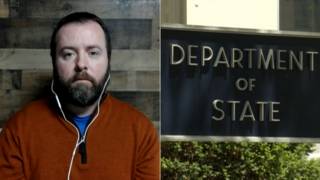
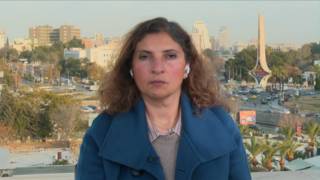
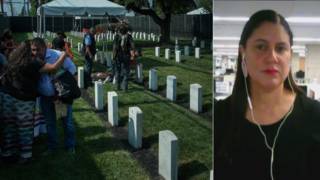






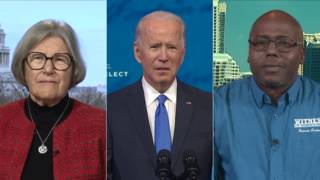
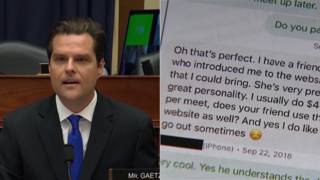
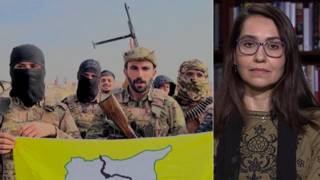

Media Options